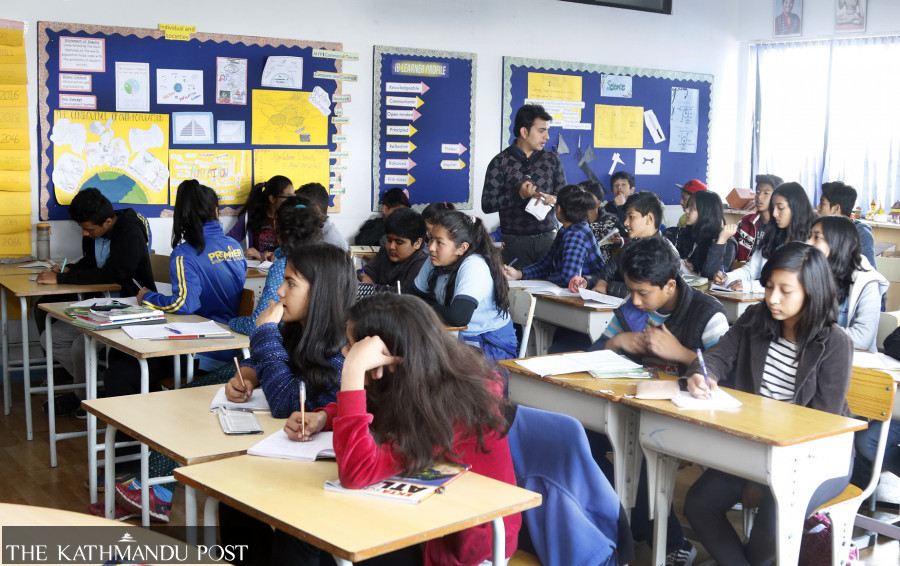National
Government backs private schools in opposing trust model
Deliberating on the School Education Bill, Minister Pant says conversion into trusts should be voluntary.
Binod Ghimire
Rubbishing the demands of some lawmakers and educationists, the government has stood against converting the ownership of private schools. Registering amendments to the School Education Bill, dozens of lawmakers had proposed converting existing private schools into trusts in order to control the commercialisation in the education sector.
However, the Ministry of Education has proposed that private schools should be allowed to continue operating under their existing status. Presenting the ministry’s position in the Education, Health, and Information Technology Committee of Parliament on Saturday, the education minister has proposed that the schools currently registered as companies be allowed to remain so, while conversion into trusts should be voluntary.
Most of the 8,000 private schools have been operating as companies and do not want to be converted into trusts. However, over the years, there has been a strong lobby of academics and a section of political leaders who argue that only the conversion of private schools into trusts can halt the ever-increasing commercialisation. Conversion into trust means that the school owners cannot distribute profits.
A high level commission, on January 15, 2019, submitted a report to then Prime Minister KP Sharma Oli recommending conversion of private schools into trusts within 10 years. However, Oli was not interested in implementing the recommendations, so he never made the report public. His successor, Sher Bahadur Deuba, followed suit. The report was only made public by the Pushpa Kamal Dahal government under pressure from then Education Minister Sumana Shrestha, who is a Rastriya Swatantra Party lawmaker.
“We cannot eliminate private schools. We can regulate them strictly and encourage them to convert into trusts,” said Education Minister Raghuji Pant in the House committee.
Shrestha was quick to rebut that the government’s position was influenced by lobbying from the Private and Boarding Schools Organisation, Nepal and other umbrella bodies of the private education providers. On several occasions, Oli has hailed the private school operators while criticising public schools.
The House committee will discuss the government’s proposal and the amendments suggested by lawmakers. In their amendment proposals, lawmakers, including those from ruling parties, have called for converting all private schools into trusts within a minimum of five years and a maximum of 20 years.
A sub-committee formed under CPN-UML lawmaker Chhabilal Bishwakarma to forge consensus on disputed provisions of the bill had failed to reach agreement in regulating the private schools, even though it had settled most of the 1,758 amendment proposals.
In his position document, the education minister has proposed reviving the district-level education offices, which are subordinate to the federal government. The Bishwakarma-led panel had agreed not to retain such offices at the district level, citing the constitutional provision that all school-level educational authority lies with local governments.
Pant, arguing that education has been listed as the concurrent authority of all three tiers of government, proposed that each district have a District Education Office. The Nepal Teachers’ Federation and education ministry officials support this.
On April 10, 2018, the government decided to place the District Education Offices under the chief district officers. However, following criticism that keeping the education office under district administration was impractical, the Cabinet on December 24, 2018 reversed the decision and brought the offices back under the federal Ministry of Education.
Experts on federalism say there is no need for the federal government’s subordinate offices at the district level.
Pant has also stood against the parliamentary panel’s agreement to retain the existing Centre for Education and Human Resource Development. He is for replacing it with the Department of Education. On July 17, 2018, the government replaced the department with a centre.
Likewise, Pant has also stood for the continuation of the Secondary Education Examination. He has proposed that the test should not be scrapped but be held at the provincial level instead.
“We will finalise the bill based on the Chhabilal Bishwakarma-led panel’s report and the government proposal,” said Ammar Bahadur Thapa, the chair of the committee. The ruling parties have a written agreement with the federation to get the bill endorsed from the lower house by June 29.




 10.12°C Kathmandu
10.12°C Kathmandu















